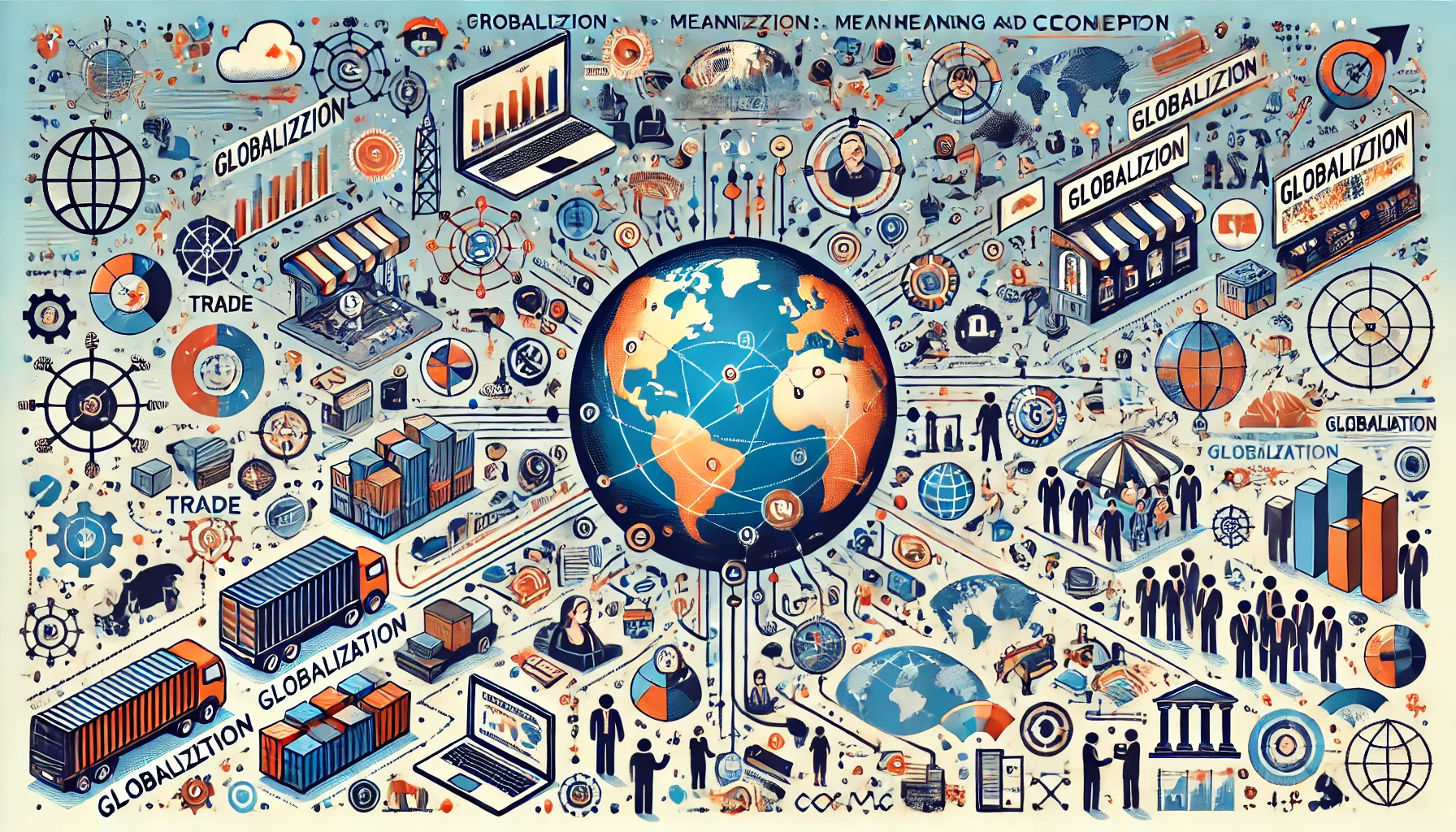Table of Contents
Meaning
Globalization refers to the process by which economies, societies, cultures, and institutions around the world become increasingly interconnected and interdependent. This process involves the exchange of goods, services, information, technology, and capital across international borders, leading to greater integration of global markets and the diffusion of ideas and cultures.
Concept
Globalization is a multi-faceted concept that encompasses various dimensions, including economic, social, cultural, technological, and political aspects. It is driven by advances in transportation and communication technologies, the liberalization of trade and investment, and the spread of information through the internet and media.
Key Dimensions of Globalization
- Economic Globalization:
- Definition: Economic globalization refers to the increasing integration and interdependence of national economies through the expansion of international trade, investment, and finance. It is characterized by the growth of multinational corporations, global supply chains, and cross-border capital flows.
- Examples: The rise of global trade agreements like the World Trade Organization (WTO), the presence of multinational corporations like Apple or Toyota operating in multiple countries, and the outsourcing of manufacturing to countries with lower labor costs.
- Cultural Globalization:
- Definition: Cultural globalization refers to the spread and exchange of cultural elements such as language, values, traditions, art, and entertainment across the world. It leads to the blending of cultures and the global dissemination of cultural products.
- Examples: The worldwide popularity of American movies, fast food chains like McDonald’s, and global events like the Olympics or the World Cup that bring together diverse cultures.
- Technological Globalization:
- Definition: Technological globalization involves the rapid spread of technology and technological innovation across the globe. It allows for the faster dissemination of information and access to new technologies, which in turn drives economic growth and societal change.
- Examples: The global proliferation of the internet and smartphones, the use of social media platforms like Facebook and Twitter worldwide, and the spread of advanced technologies like artificial intelligence (AI) and renewable energy solutions.
- Social Globalization:
- Definition: Social globalization refers to the increasing interconnectedness of societies and the development of global social networks. It includes the spread of social norms, values, and practices, as well as the global movement of people, such as migration and tourism.
- Examples: The rise of global social movements like climate change activism, the influence of international human rights organizations, and the increased interaction between people from different cultures through travel and social media.
- Political Globalization:
- Definition: Political globalization involves the increasing influence and integration of political institutions and systems across borders. It includes the formation of international organizations, treaties, and agreements that govern global relations and address issues like security, human rights, and environmental protection.
- Examples: The role of the United Nations (UN) in international diplomacy, the influence of the European Union (EU) in regional governance, and global agreements like the Paris Climate Accord.
Drivers of Globalization
- Technological Advancements: Innovations in transportation, communication, and information technology have made it easier and cheaper to move goods, services, capital, and information across borders.
- Trade Liberalization: The reduction of tariffs, trade barriers, and restrictions on foreign investment has facilitated the free flow of goods and services, leading to the expansion of global trade.
- Global Communication Networks: The internet and global media have connected people around the world, enabling the rapid spread of information, ideas, and cultural influences.
- Growth of Multinational Corporations: Companies that operate in multiple countries have driven economic integration by establishing global supply chains and production networks.
- International Agreements and Institutions: The formation of international trade agreements and global institutions like the WTO, International Monetary Fund (IMF), and World Bank has promoted economic cooperation and integration.
Impacts of Globalization
- Economic Growth and Development: Globalization has contributed to economic growth by opening up new markets, increasing trade and investment, and fostering innovation. Developing countries, in particular, have benefited from access to global markets and technology.
- Cultural Exchange and Diversity: The spread of cultures has led to greater cultural exchange and diversity, enriching societies and fostering mutual understanding. However, it has also raised concerns about cultural homogenization and the loss of local traditions.
- Inequality and Disparities: While globalization has lifted many out of poverty, it has also led to increased economic inequality, both within and between countries. The benefits of globalization have not been evenly distributed, with some regions and populations gaining more than others.
- Environmental Challenges: Globalization has contributed to environmental degradation, including deforestation, pollution, and climate change, as economic activities expand and resource consumption increases. Global efforts are now focused on addressing these challenges through sustainable development practices.
- Political and Social Tensions: The interconnectedness brought by globalization has also led to political and social tensions, as people and governments grapple with issues like immigration, national sovereignty, and the impact of global economic forces on local communities.
Conclusion
Globalization is a complex and dynamic process that has reshaped the world in profound ways. It has brought significant economic opportunities, cultural exchange, and technological progress, but it has also created challenges related to inequality, environmental sustainability, and social cohesion. Understanding the meaning and concept of globalization is essential for navigating its impacts and ensuring that its benefits are shared equitably while addressing its challenges effectively.

